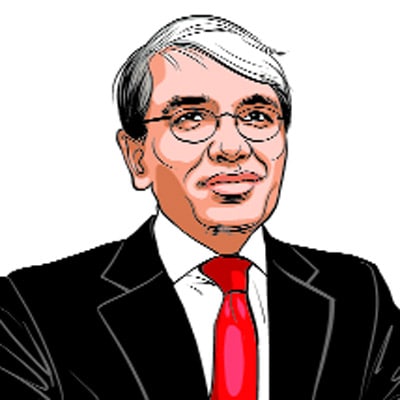Accountable & adventurous
State must be both — to tackle both corruption and poverty. Political parties must stop fighting yesterday’s wars

Corruption probably knocks off 2 per cent of our GDP and poverty stunts the lives of 300 million Indians; solving both problems needs an accountable and adventurous state. (Representational Image)
Indians are exasperated with corruption and exhausted by poverty. But therein lies the tension: Ending poverty needs a more adventurous state while ending corruption needs a more accountable one. India has been stuck in a low-level equilibrium of low productivity whose destruction needs more risk-taking; Margaret Thatcher told a cabinet colleague who appointed committees but never got anything done “Your brain is not attached to your backbone”.
There is huge public appetite for blood — accountability — for large frauds in telecom, coal, land, and banks. However, every doctor knows that post mortems have a certainty that prescriptions don’t; any state will freeze if our corruption investigators do not learn how to distinguish between fraud, incompetence, bad luck, and poor judgement. Recent amendments to the Prevention of Corruption Act will protect honest risk-takers but these changes are not enough. The only sustainable solutions for accountability and risk-taking to co-exist in our state are Rationalisation, Institutionalisation and Specialisation. Let’s look at each in more detail.
Rationalisation means that the Indian state must do less, so it can do more. We don’t need 50 plus central ministries, 200 plus people with the rank of secretary to Government of India, and 300 plus central Public Sector Units. Governing organisations that take large commercial risks with long tails is difficult without active shareholders even in the private sector but almost impossible with the government as shareholder. The diet coke approach to governance — the taste without the calories — has been expensive in government commercial organisations; the potential bad loan write-offs of our public-sector banks exceed 10 years of central government allocation to primary education and Air India’s cumulative losses could double our spending on courts for the next four years. A modern state must focus on healthcare, education, roads and police and this needs doing less; only 25 central ministries and 25 PSUs.
Secondly, Nobel Laureate Douglas North insightfully suggested that the difference between poor and rich countries is institutions. This hardly means that bureaucrats, technocrats and judges should protect a country from its politicians; a wonderful new book, Unelected Power, by Paul Tucker meditates on the consequences of big decisions being made by people who don’t face elections. But institutions balance myopia (short-sightedness) and hypermetropia (long-sightedness). The key is how institutions work in practice rather than theory; over the last few decades massive informal employment mocked honest employers, money laundering shell companies mocked tax payers, banks making big loans they knew they wouldn’t recover mocked honest small borrowers, and bad loan accounting mocked common sense. Purposeful action over the last few years in ending our sense of humour about the rule of law — demonetisation, GST, RERA, shell company evisceration, Bankruptcy Code, Fugitive Bill, bad loan accounting, Provident Fund enforcement, etc — is only a start.
The third solution is specialisation. Politicians agree on the wisdom in the quip that they campaign in poetry but govern in prose but disagree on their relative importance. This echoes a debate in leadership between generalists and specialists that will never be resolved because any healthy organisation needs both. But Indian policy-making already has many generalists; they are called politicians. Politicians need assistance by technocrats not bureaucrats because fixing the state failure in education, healthcare, public finance, urbanisation, banking, etc needs the inch-wide mile-deep human capital (networks, intuition, knowledge, research familiarity, judgement, experience, etc) that comes from marinating in something for decades rather than the mile-wide inch-deep perspective that comes from switching thought worlds every 24 months. This also applies to investigating agencies with 3 per cent conviction rates, spray-and-pray chargesheets, and questionable arrests (like bankers by Maharashtra state police recently).
We could start with applying this framework to banking. The case for rationalisation is clear; banks make loans, some will always go bad, and stupidity is not illegal. But public-sector banks are more accident prone, taxpayers pay for their mistakes, and 21 is too many. The case for institutionalisation is clear; governance even in private sector banks — places where there is skin in the game and capital has a voice — lately has been regrettably complicated and delayed but a healing process set off by shareholder action, board churn and regulatory action create important precedents. The current Department of Financial Services has successfully ended Delhi phone banking, but the current nationalised bank ecosystem is inadequate for creating the right governance, culture and consequences. We need another layer of institutionalisation; the RBI is atoning for decades of invertebrate mimicking by fixing bad loan handling with its bankruptcy advocacy and the February 12 circular. But it must be allowed to stay the course rather than be blunted by dangerous stuff like power sector court submissions recommending forbearance — this corrodes IBC principles — and distracting stuff like a committee whose terms of reference explicitly include exploring fudging bad loan accounting.
Bureaucrats either look up at technocrats or down on them; never straight across. This results in caricatures that impede getting a clearer look but areas like banking need specialisation. Government bank ownership must shift to a specially staffed, continuously trained, autonomous, independently governed holding company that holds banks to high performance standards (growth and credit quality) and commits to a 24-month deadline of ending access to government money that is desperately needed in education, apprenticeships, and health care.
Political parties stuck in the rhetoric of left and right are exhausted and no longer have answers because they fight yesterday’s wars rather than address today’s inter-disciplinary challenges of surplus food production, gridlocked cities, civil service performance management, learning outcomes, health care, and living wages. Corruption probably knocks off 2 per cent of our GDP and poverty stunts the lives of 300 million Indians; solving both problems needs an accountable and adventurous state. Getting there involves being different, not bigger, better or smaller. To paraphrase philosopher J Saul, our citizens deserve a massive restructuring of the state because they are not customers of bureaucrats but their employers.
The writer is with Teamlease Services
For all the latest Opinion News, download Indian Express App
More From Manish Sabharwal
- The virtues of formalityA massive enterprise formalisation is taking place, and one year of GST has given the process a boost...
- How knowing English helpsDelhi’s move to introduce spoken English lessons for govt school students taps into a long-felt desire...
- Signals from a bankruptcyThe Bhushan case is a brick in the wall of a new corporate meritocracy where rule of law matters...








































No hay comentarios:
Publicar un comentario